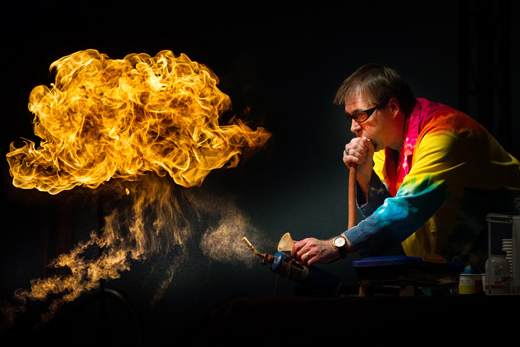Rows of children sat with rapt attention, their mouths agape at what they were seeing at the Atlanta Science Festival.
"That look of wonder is why we do it," says Douglas Mulford, director of undergraduate studies of chemistry and senior lecturer at Emory. "We wanted to show the 'wow' of science and show how fascinating it can be."
Mulford was one of many Emory faculty, staff and students who participated in 25 Emory demonstrations and exhibits at the Atlanta Science Festival March 22-29. The massive weeklong festival included more than 100 events at nearly 35 venues and everything from tours and film screenings to trivia nights and flashy science demonstrations.
At the festival's science expo March 29 at the Georgia World Congress Center, Mulford and several Emory students put on a science stage show with bubbling beakers and exploding balloons to a packed room with an audience of around 1,000.
Mulford also oversaw the very popular "cornstarch dance pit," a three foot by three foot pit where visitors could dance or sink in the cornstarch and water mix.
"As long as you dance, you stay up. When you stop, you sink. That was a lot of fun," Mulford says.
Other Emory exhibits at the expo, which attracted tens of thousands of visitors, included monarch butterflies, the opportunity to touch a real brain and a booth that allowed visitors to swab the bottom of their shoe or their ear and follow the growth of the bacteria they'd swabbed over a few hours or days via a website.
The Atlanta Science Festival was co-founded by Jordan Rose, associate director for outreach at Emory's Center for Science Education; Sarah Peterson, coordinator of graduate student development at Emory; and Meisa Salaita, a research scientist at the Georgia Institute of Technology. The trio had heard about similar science festivals in other large cities and thought it was about time for Atlanta to host its own.
"The idea was born here at Emory and then we had 83 partners who helped bring our dream to fruition," says Rose. "We wanted people to see science as something that underlies everything. We wanted people to see themselves as scientists."
Georgia Tech and the Metro Atlanta Chamber of Commerce joined Emory as founding partners and many, many, Atlanta organizations signed on as partners, including Delta Air Lines, Georgia State University, AT&T, Mercer University, Cancer Treatment Centers of America, Lockheed Martin, Georgia Power, Kennesaw State University and The Coca Cola Company.
Emory's partnership in the event was funded by the offices of the President and Provost, the Center for Science Education and with help from National Science Foundation and Howard Hughes Medical Institute grants.
In addition to promoting a love of science, the festival was also designed to help showcase the importance of Atlanta's science and technology community, which includes not only research universities such as Emory and Georgia Tech but also organizations such as the U.S. Centers for Disease Control and Prevention, the American Cancer Society and so many others, says Rose.
"There is amazing science and technology innovation happening in Atlanta and so many companies that rely on that science and technology. We wanted those who live here to know that and be proud of it," says Rose.

